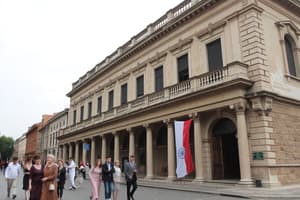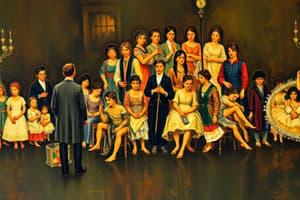Podcast
Questions and Answers
¿De dónde se originó el idioma italiano?
¿De dónde se originó el idioma italiano?
- Del latín clásico
- Del francés
- Del español
- Del latín vulgar (correct)
¿Qué evento histórico impulsó la estandarización de los dialectos italianos?
¿Qué evento histórico impulsó la estandarización de los dialectos italianos?
- La unificación de Italia en 1861 (correct)
- La Revolución Francesa
- La caída del Imperio Romano
- La invasión normanda
¿Qué influencias lingüísticas ha recibido el italiano en su evolución?
¿Qué influencias lingüísticas ha recibido el italiano en su evolución?
- El alemán y el ruso
- El chino y el árabe
- El francés y el esloveno (correct)
- El inglés y el portugués
¿Qué característica distingue a los dialectos regionales del italiano estándar?
¿Qué característica distingue a los dialectos regionales del italiano estándar?
¿Qué aspecto gramatical es señalado como único en el italiano?
¿Qué aspecto gramatical es señalado como único en el italiano?
¿Qué tipo de pronombres reflexivos se utilizan en italiano para transmitir una sensación de reflexividad?
¿Qué tipo de pronombres reflexivos se utilizan en italiano para transmitir una sensación de reflexividad?
¿Cómo se caracteriza la literatura italiana en términos de autores renombrados?
¿Cómo se caracteriza la literatura italiana en términos de autores renombrados?
¿Cómo se describe la contribución de la cultura italiana al cine, arte y arquitectura?
¿Cómo se describe la contribución de la cultura italiana al cine, arte y arquitectura?
¿Cuál de las siguientes opciones describe mejor la fonética italiana?
¿Cuál de las siguientes opciones describe mejor la fonética italiana?
¿Qué similitudes presenta el italiano con otros idiomas según el texto?
¿Qué similitudes presenta el italiano con otros idiomas según el texto?
Study Notes
Exploring the Beauty and Complexity of the Italian Language
Italiano, the language of la dolce vita, has enraptured millions worldwide with its melodious cadence and intense emotional expressiveness. Beyond the captivating pronunciation and rich culture, Italian is a linguistic marvel with a fascinating history and nuanced intricacies.
Origins and Influences
Italiano, part of the Romance language family, originated in the 9th century from Vulgar Latin, the spoken Latin of the time. Over centuries, Italian evolved as various Italian dialects became standardized, driven by the unification of Italy in 1861.
Italian carries the influence of its Latin roots and the Italian peninsula's diverse linguistic heritage. Geographically, Italian borders several languages, including French and Slovenian, and has been enriched by their cultural and linguistic exchange.
Regional Dialects
Italian is not a monolithic language; instead, it boasts a wealth of regional dialects. These dialects range from the northern Lombard, Venetian, and Friulian to the central Tuscan and Umbrian and the southern Sicilian, Calabrian, and Pugliese. Many of these dialects have distinct pronunciations, grammar, and vocabulary, contributing to the language's richness and diversity.
Grammar and Vocabulary
Italiano's grammar features several unique aspects, such as the use of verb tenses and subject pronouns. For example, Italian uses the future simple tense instead of the future progressive tense, and it uses the reflexive pronouns "si" and "si stessi" to convey a sense of reflexivity not found in English.
Italian has a large lexicon, consisting of Latin vocabulary, neologisms, and borrowings from other languages, particularly German and French. The language is known for its numerous synonyms, adding nuance to its expression.
Literature and Culture
Italian literature is a treasure trove of world-renowned works, including those of Dante Alighieri, whose "Divine Comedy" remains one of the most important texts in Western literature. Other notable literary figures include Petrarch, Boccaccio, and Manzoni.
Italian cinema, art, and architecture have also made substantial contributions to global culture. From iconic films like "La Dolce Vita" to the masterful works of Leonardo da Vinci, Michelangelo, and Raphael, Italian culture has left an indelible mark on the world.
Pronunciation and Phonetics
Italiano is known for its melodic sound, with the music of the language carried by its vowels and consonants. Italian has five vowels and a rich variety of consonant sounds, including fluted consonants like "f" and "s," and glottal stops, represented by a raised "h" in words like "piano" and "ghianda."
Learning Italian
Italiano is a language that many people find enjoyable and rewarding to learn. Due to its Romance language roots, Italian shares similarities with languages like French, Spanish, and Portuguese, though it has a distinct set of vocabulary and grammar rules. Italian language courses are available worldwide, and numerous immersive programs, such as study abroad programs, help learners to master the language.
In conclusion, Italian is a complex, beautiful language with a rich historical background and a fascinating cultural heritage. Its grammar, pronunciation, and vocabulary offer a wealth of opportunities for exploration and expression. Whether you're a language enthusiast or simply curious about the intricacies of this enchanting language, immerse yourself in the world of italiano and discover a whole new realm of expression and understanding.
Studying That Suits You
Use AI to generate personalized quizzes and flashcards to suit your learning preferences.
Description
Descubre la historia, la influencia cultural y lingüística, los dialectos regionales, la gramática, el vocabulario, la literatura y la cultura italiana, así como la pronunciación y fonética del apasionante idioma italiano. Sumérgete en este quiz para explorar las intricadas maravillas del italiano y enriquecer tu comprensión de este idioma romance.




